ChatGPT: Exciting but Limited for Health and Fitness Advice, Here’s What It’s Best Used For.


The smartest people I know have been playing with ChatGPT ever since it came out this month. I started playing with it a few days ago, exploring how useful it is and testing its limitations with its recommendations in the health and fitness world and beyond.
What is ChatGPT?
This is OpenAI’s chat-focused language model that uses artificial intelligence to provide answers in a conversational form. Some argue that this has the power to replace Google because it answers questions far more directly than any Google results. However, just like if you were reading a random post on the internet by an unvetted source, you don’t know if what you’re reading is correct, in fact it is often incorrect and unsourced, but you wouldn’t be able to know if it is or not if it’s not your area of expertise. But let’s explore its beautiful capabilities and limitations…
How does this hold up when asking about bodyweight fitness?
For example, I asked it, “What is the best pullup progression?” and this is the answer it spit out.
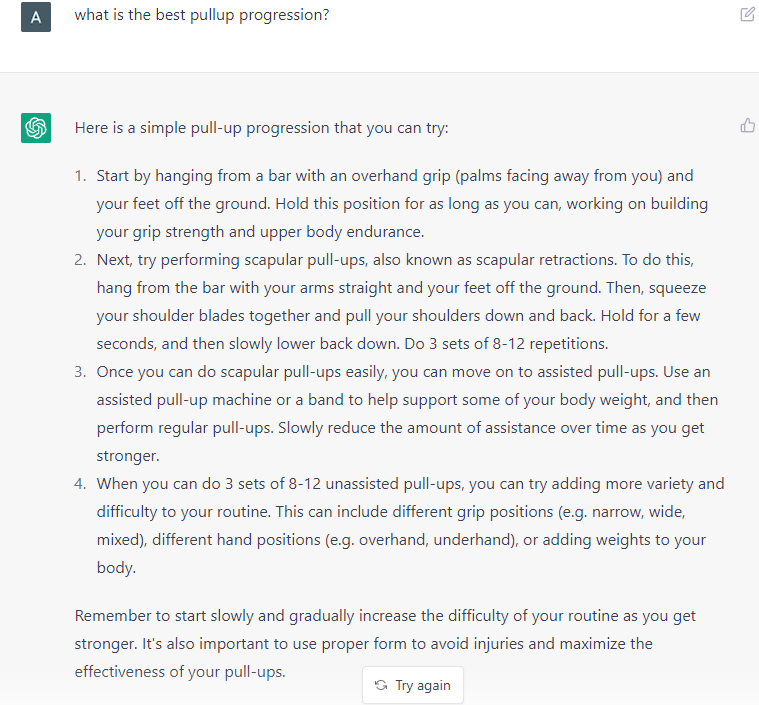
Beautifully written and it gave what looks like a great answer. The first two progressions are spot on, I always talk about scapular pulls. For the 3rd progression it said to move onto band-assisted pullups or use an assisted pullup machine and reduce the assistance overtime.
If you didn’t know any better, this sounds like a fantastic pathway. However, band-assisted pullups and assisted pullup machines are not a great way to achieve pullups. (They remove all the scapular control needed to execute a pullup.) The most important exercise at that point would be to work on negative pullups and use the band-assisted pullup as a supplemental exercise. But you wouldn’t know this if it wasn’t your area of expertise.
So I decided to try again with a new conversation and this is how that went…
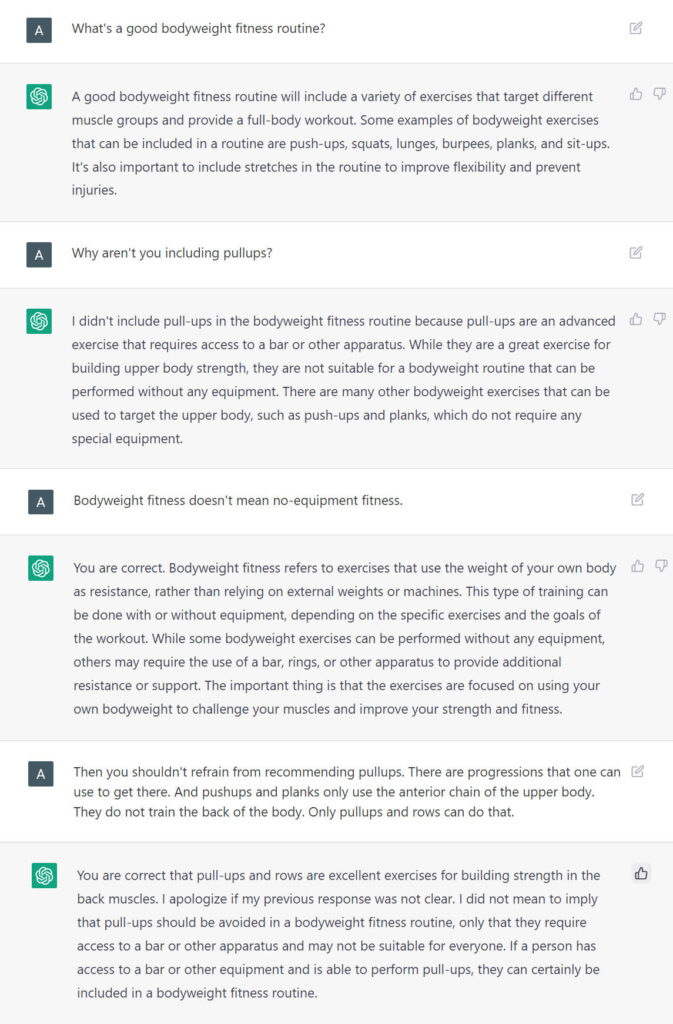
Now at his point, it is extremely impressive how well it works in chat-form. But it’s almost like I need to school it and tell it where it’s wrong to get the info out of it that you otherwise would have missed. So I continue now by asking what are good upper back exercises using your bodyweight?
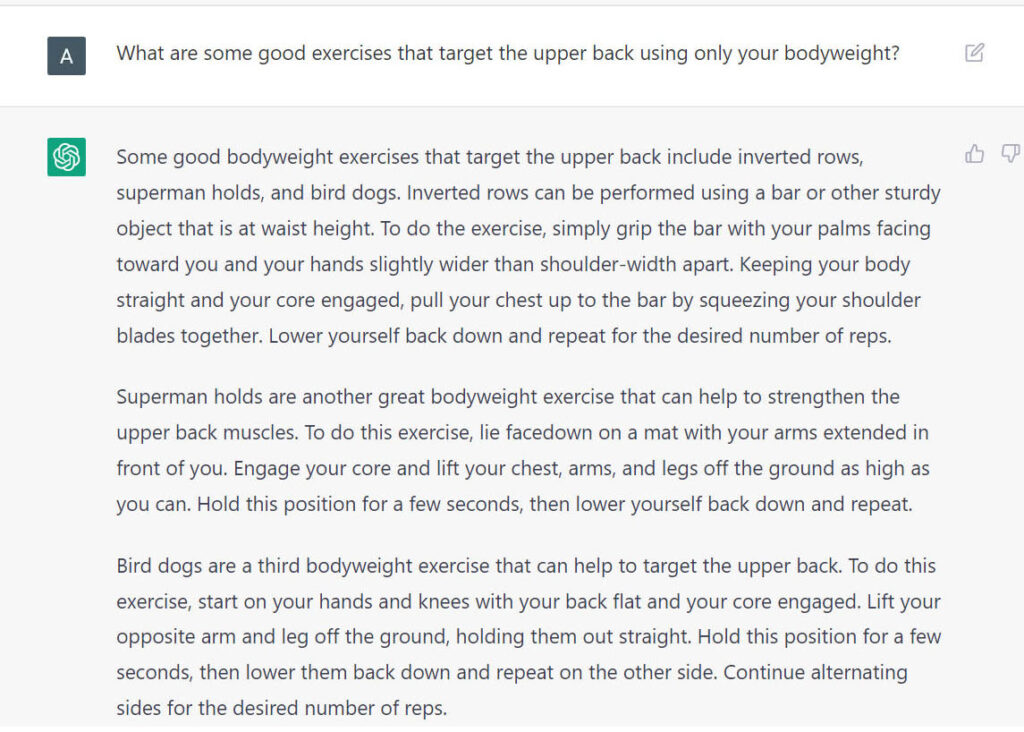
Okay so it recommended rows which are indeed a fantastic exercise for the upper back (which I’ve created a video for recently). Along with that it recommended the superman pose and bird dogs.
Superman pose and bird dogs might be good for a warm-up (I include the former in my bodyline drills) but they are not great upper back exercises. These are good suggestions if you’re really out of shape but saying supermans and bird-dogs TARGET the back muscles is like saying just standing around targets the quads and glutes. They’re not intense to begin with (not much load) and dead-end exercises (no way to make it harder). So I continue by telling it that it forgot to include pullup progressions since they are the ultimate exercise for targeting the upper back.
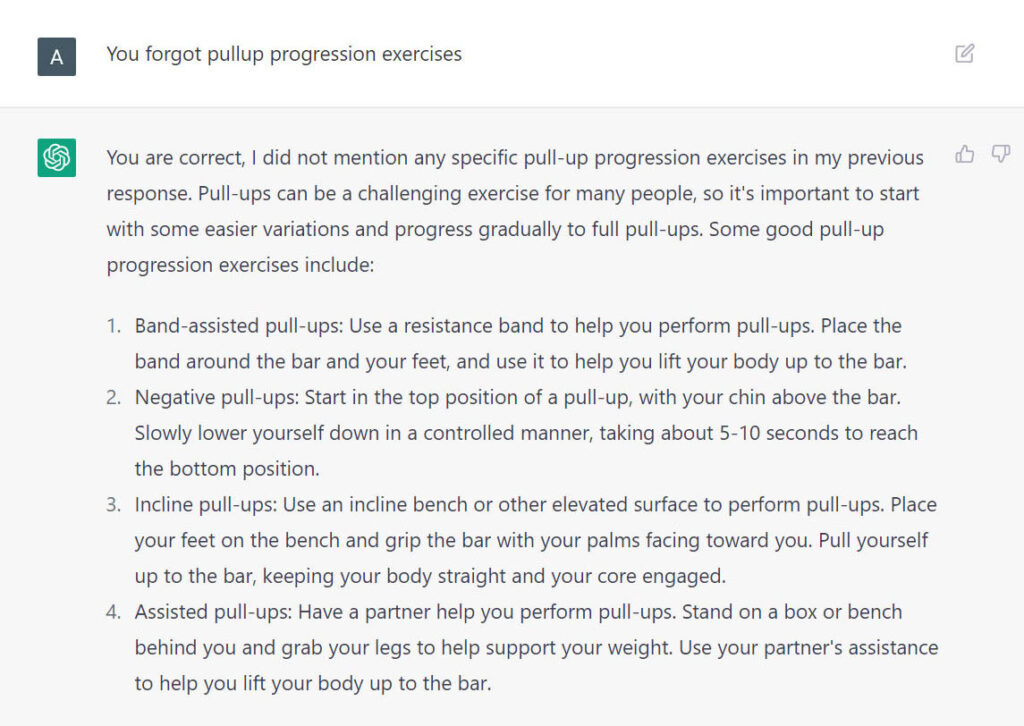
Interestingly, it included the suggestion to do negative pullups in this answer! ChatGPT is like a very eager-to-learn student that wants to get straight A’s. It is constantly learning everything through reinforcement. But it has A LOT to learn. And people like me need to help refine it or coax the right answers out of it. If this isn’t your area of expertise, you wouldn’t even know how to coax the right answer out of it.
The problem with ChatGPT and other AI generators is that they’re confidently wrong.
There is no guarantee that any of the information that it provides is actually accurate. It just writes things it deems to sound convincingly correct which is very different than actually being correct. I’ve ran across several examples of it eloquently explaining answers that are objectively false but you wouldn’t know it if it wasn’t your area of expertise.
This reminds me of the Gell-Mann amnesia effect
You know when you read an article of YOUR expertise, you very quickly will note how much of it is bullshit and wrong, because it’s your domain and the journalist writing it is not as qualified as you. The Gell-Mann amnesia effect is the phenomenon where experts believe news articles on topics outside of their fields of expertise, even after acknowledging that articles written in the same publication within their own field are error-ridden and full of misunderstanding.
In short, when you’re reading something you’re an expert of, you can spot the bullshit very readily, but when you move onto another topic that you’re ignorant of, you have amnesia and for some reason, believe that all of that other topic is accurate.
This is exactly the same thing happening here with ChatGPT. You ask it questions, give it demands and it spits out very cogent, well written, believable answers that you might mistake for perfect accuracy. You may believe the answers it’s giving you are quality, but in some ways it’s not too different than google pulling out info from a blog post. (With Wolfram-Alpha, you know it’s giving you perfectly accurate answers, however that is limited in its scope.)
So an important tip about using this tool when requiring accuracy: you can only trust what you already know.
So what is it best for? What other things could you ask it?
The sky is the limit, really! Remember when Google just started to become popular and you started to test how creative you can be in your questions to get interesting results? It’s like that all over again!
You could ask it to create a diet plan for you, a meal plan, a grocery list using that meal plan, even create a workout for you!
You could even ask it to suggest recipes given the list of things in your fridge currently.

This gave me the idea and inspiration to google casserole recipes and ended up making it!
The best uses are where creativity is more valued than precision: brainstorming, drafting, presenting information in creative ways.
Another example, I asked it to give me titles for this blog post:
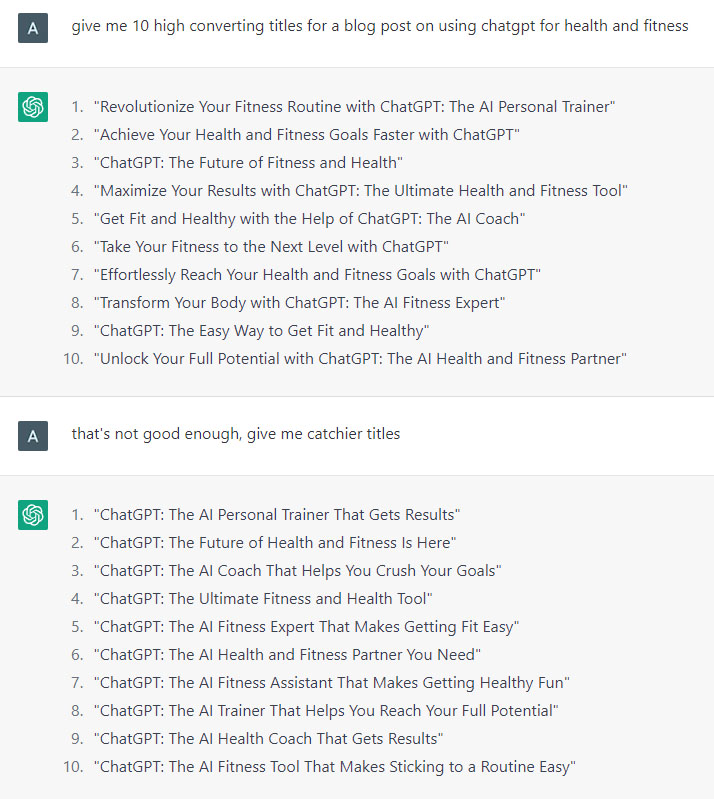
I then asked it to generate metadata for the title I chose…
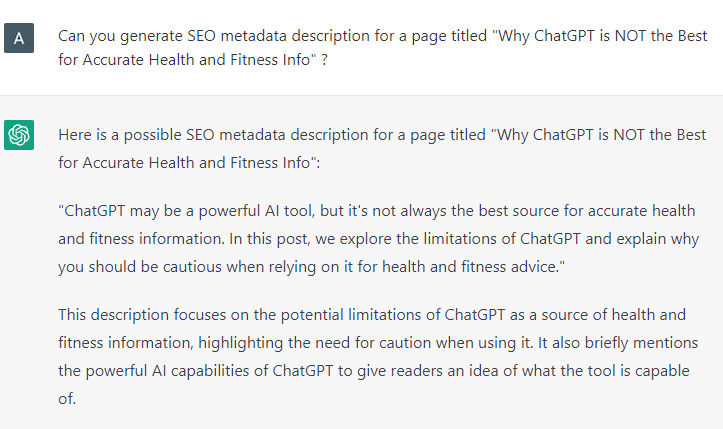
You could even ask it to write the actual blog post…
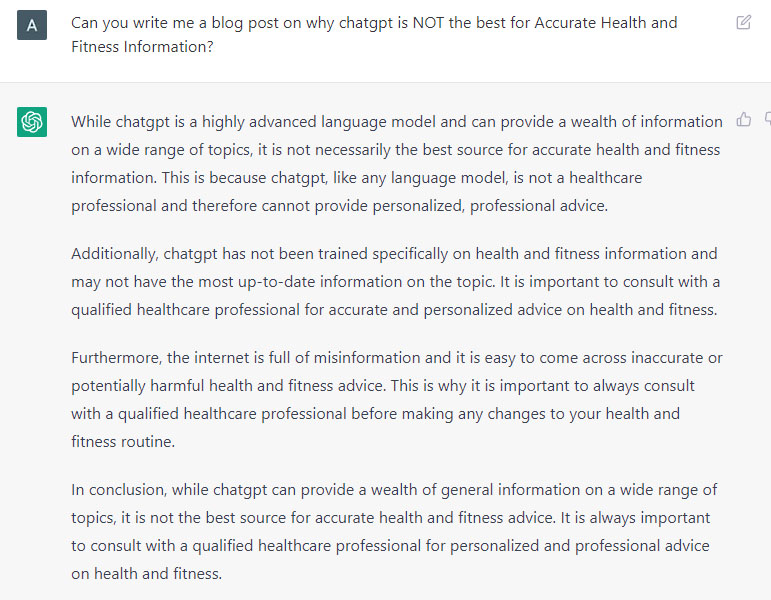
What else is it useful for?
Most people are using it in regards to programming/coding and when it works, it saves you a ton of time. (It spits out bug fixes and explains why and it’s much better than having to rummage through stackexchange for an answer.)
What else? You could ask it to mock up a will, or create a contract for a commercial lease! You could even ask it to help you create entire sit-coms! It seems to be most helpful for helping you to brainstorm anything you need. For example…

Honestly, it is perfectly capable to replace a novice SEO marketer that would charge $50k/year. It can and will replace many jobs. It can generate things in minutes that would take a marketer at least a day. Ask it to create a business plan, to ideate, to write, to review technical basics and so forth.
It can also be an incredibly powerful tutor when you need explanations for things. Students can use it to write up entire essays or outlines! (Good luck teachers on fighting plagiarism!)
This is generally mind-blowing and it seems most incredibly useful for helping you get out of any mental ruts. And the results can be super fun sometimes like this…
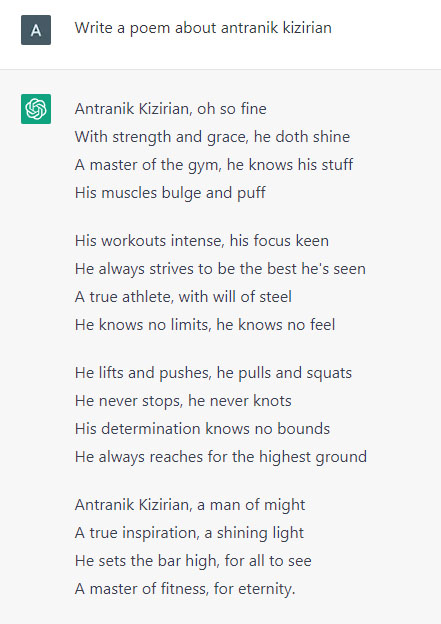
As you can see, it is terrific at creative writing. Will it replace me? Nope but it definitely will replace some peoples jobs and increase their efficiency by leaps and bounds. The sky is the limit of things you can ask it and that in itself makes it a terrifyingly amazing tool that is as thrilling as the year Google came out.
We used to think that AI would be the last to replace creative projects, but it seems to be most useful for that at the moment, which is beyond mind-blowing.
Considering this is only the start of what we can do with AI, I can’t wait to see what future versions will be like. I highly recommend you use it while it’s free because this will probably cost a lot after it’s out of the experimental beta phase. Just remember that most of what it spits out is not bound to be correct, but it IS very helpful for creative writing and most especially problem solving in regards to programming/coding. I hope this was as mind-blowing to you as it for me.






